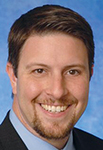By BETSY TAYLOR
Catholic moral theology has a long tradition of wrestling with the ethical issues surrounding death and dying, but one area that remains a particular challenge is how to proceed when patients and families seek care that health care providers consider medically inappropriate.

Kockler

Stuart
In an April 29 CHA webinar called Medically Inappropriate Treatment: Can We Do Better? Nick Kockler, senior ethicist and director of ethics education at the Providence Center for Health Care Ethics in Portland, Ore., and Dr. Kelly Stuart, medical ethicist at Bon Secours Health System in Richmond, Va., talked about why requests for medically inappropriate treatment, sometimes called futile treatment, continue to be a challenge. They also discussed ethical considerations for approaching such requests, and they described strategies for preventing, reducing or resolving these situations.
One reason that a request for medically inappropriate care is a challenge for care providers is that they may experience moral distress when asked to provide treatment that will not achieve the desired goal of a patient or the patient's loved ones, and may cause injury or harm. Moral distress occurs when a care provider knows the ethically appropriate action to take, but feels powerless to take that action.
A tension point arises when patients and their families believe or suspect that a clinician is not doing all he or she can for the ill patient. Kockler and Stuart explained that a strong therapeutic relationship can help build a foundation between a clinician and patient.
The therapeutic relationship involves the bond a care provider has with a patient and the patient's family. It relates to the care provided, and hopefully the shared goals of those in the therapeutic relationship, they said. In this relationship, care providers should be able to demonstrate clinical empathy.
Patients and the patients' loved ones may request medically inappropriate treatment because they don't see it as inappropriate; or they're seeking a way to save or prolong the life of the patient. The speakers said clinicians should bear in mind disparities in access to health care and how some patients or their relatives may mistrust the health care establishment based on their own perceptions and experience of it.
Clinicians also need to be knowledgeable about religious and cultural differences, and how the language used to talk about care may allow patients' surrogates to better understand care options, and perhaps take the burden of the decision off the surrogate. As an example, Kockler said to explain to a family reluctant to end an ineffective treatment that a patient would benefit from end-of-life palliative care, a care provider could say: "The most loving thing to do right now is to make the patient comfortable."
Stuart said communicating with a patient about the patient's own hopes, expectations and goals for his care is important. Clinicians then need to keep patient care geared toward those care goals. However, she said, clinicians need to recognize that they're the ones in the room with the medical expertise. In pursuing those goals, physicians should not be neutral on a patient's course of treatment. She said physicians deal with medical uncertainty as part of their professions, and they have to give their best opinion about interventions based on evidence.
Kockler said another way to help a patient or his family is to educate them about clinical milestones, for instance by explaining, "If we don't see X, Y and Z, we'll know the care isn't working." He said in some cases, setting a time frame for goals like this can help.
Stuart and Kockler pointed to a number of ways to reduce the chances of conflict related to requests for medically inappropriate care, among them community efforts to encourage advance care planning and developing community standards so that clinicians will know best practices and what to do when a patient seeks medically inappropriate care. Stuart said creating community standards can be helpful so that expectations are clear and resources can be aligned in end-of-life care.
Copyright © 2015 by the Catholic Health Association
of the United States
For reprint permission, contact Betty Crosby or call (314) 253-3477.